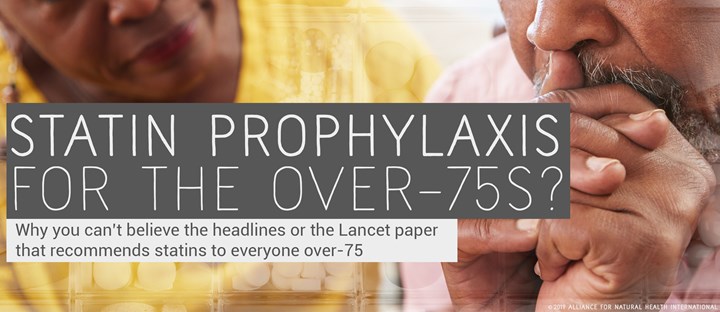Content Sections
By Rob Verkerk PhD, founder, executive and scientific director, ANH-Intl
This latest Cochrane update on Omega-3 fatty acids and cardiovascular disease (CVD) risk continues the long saga of conflicting results from studies. It appears as an attempt by researchers with a specific and very narrow view of evidence to marginalise all the many positive observational studies, let alone clinical outcomes, that point to the importance of increasing our intake of long-chain Omega-3 fatty acids (LCn3), both from marine sources (as EPA and DHA) and/or from plants (in the form of alpha-linolenic acid, ALA). This Cochrane review updates the original Cochrane review on primary and secondary prevention studies on CVD in 2004. It also conveniently follows the JAMA published meta-analysis of March 2018 that we critiqued earlier this year. Both the Cochrane 2018 update (review of 79 trials, mainly on supplements) and the JAMA 2018 meta-analysis (10 trials) suggest no effect. Both only considered randomised controlled studies (RCTs) that met their respective, narrow inclusion criteria.
Design your own results
The interesting phenomenon about the scientific method is that while in theory you can use a methodology that delivers greater accuracy under highly controlled conditions, you can also lose the ability to see ‘the wood for the trees’. The 2018 Cochrane update is characterised as the ‘Big Daddy’ of all Omega-3 studies because it has looked at both primary prevention and secondary studies (the former look at the ability to prevent disease before it’s even started, the latter, the ability to reduce disease in pre-diseased populations). The Cochrane review also only includes RCTs that have assumed position as the gold standard in the evidence-based medicine hierarchy of evidence.
But this limited approach ignores an overwhelming body of evidence that shows that industrial diets for the majority of the world’s population have transitioned our omega 6 to 3 ratios so dramatically in the direction of omega 6 fatty acids (LCn6), which are pro-inflammatory. And inflammation underpins all the most burdensome diseases of our current age, including heart disease, cancer, obesity, type 2 diabetes, osteoarthritis, Alzheimer’s…. the list goes on. Pre-industrial diets probably had an omega 6 to 3 ratio of around 1:1 whereas modern, Western diets are typically 20:1 or even higher.
By narrowing the inclusion criteria, and eliminating observational studies, case reports and other studies of clinical significance, you can get the results you want. And Cochrane has a long-established tradition of finding negative results for omega-3 fatty acids for a host of conditions, such as autism spectrum disorders, cystic fibrosis, bipolar disorder, dementia, depression, Crohn's disease, ulcerative colitis, age-related macular degeneration, etc (type "omega 3 fatty acids" in the search box at https://www.cochranelibrary.com/search and see for yourself). Why upset the flow? The researchers involved, it seems, never question why so many clinicians who are measuring markers for CVD and closely monitoring the wellbeing of their patients find them indispensable.
Eliminate studies that you don’t like
Another eye-opener is the dismissal of key findings in the seminal US Agency for Healthcare Research and Quality study by Balk et al 2016, to which, interestingly, the Cochrane reviewers provide a dead link. Balk and colleagues included 61 RCTs and 37 longitudinal observational studies. Surprise, surprise, while they encounter limited evidence of benefit from the RCTs (that we think can be explained by factors including insufficient dosage, lack of knowledge of baseline LCn3 status and an array of confounding factors), the observational studies – ignored by Cochrane – showed clear benefit for several CVD outcomes especially with higher marine oil intake.
Downplay what positive evidence you do find
Even when you tease out the data from the Cochrane review, you see almost entirely consistent effects showing a relative risk in favour of the treatment group compared with the control (see Outcomes table). It’s just that these effects were not sufficiently great to be viewed as significant statistically (i.e., there’s too much ‘noise’ in the data and the small therapeutic effect is ‘lost’). A likely explanation of this is that in the context of modern diets plagued by industrially-produced sources of omega-6 fatty acids (especially refined vegetable oils), the dosages administered in the RCTs were insufficient to reveal overwhelming benefits in the 12 to 72 months periods of study. The Cochrane reviewers are surprisingly mute on the effects of dosage or the LCn6 to LCn3 ratio.
Within the text of the Cochrane review you’ll actually find clear evidence that the researchers agree on some salient facts. This includes the consistent ability of LCn3 fatty acids (marine or plant derived) to reduce various biomarkers of CVD risk, especially serum triglyceride levels, with no significant accompanying side effects.
Pro-statin stitch-up?
As you have no doubt gathered by now, the way in which evidence has been construed and communicated in both this Cochrane update and the JAMA meta-analysis befit a calculated attempt by those who have something to be gained by protecting the ongoing prescription of statins. That doesn’t necessarily point to the statin/drug industry directly (Cochrane has for example declared no conflicts of interest among its reviewers), but to researchers whose funding is dependent on that industry.
All of this highlights a further problem: the chasm that continues to exist between desk-based researchers who are totally divorced both from on-the-ground clinicians who work with these kinds of natural products and the millions who have experienced their benefits.
Another view
In case you thought we might be alone, we’ve included some excerpts from a recent review published by the Orthomolecular Medicine News Service, by our friend and colleague, highly experienced ecological medicine practitioner, Dr Damien Downing and Robert Smith PhD, a physiologist and Research Associate Professor at the University of Pennsylvania Perelman School of Medicine.


Dr Damien Downing Robert Smith PhD
Drs Downing and Smith write;
There are many things wrong with this review. Somebody's PR department has spun the review's "no clear evidence of benefit" into "evidence of no benefit" - absence of evidence becoming evidence of absence. And clearly the media were entirely happy to take that one and run with it.
A systematic review gives an opportunity to write over the conclusions of a whole list of papers with your new version of the truth. You do that by the way that you select and exclude them. For instance there was a meta-analysis (that's a systematic review with more numbers) in 2005 that concluded that vitamin E supplements significantly increased the risk of death. The way they did that was to rule out any study with less than 10 deaths - when fewer deaths was exactly the outcome they were supposed to be looking for. The reason they gave for doing that was "because we anticipated that many small trials did not collect mortality data." We're not buying it; they used it as a trick to enable them to get the negative result they wanted - to over-write the findings of a long list of original studies.
And here we have authors doing the very same thing in this omega-3 study - and upping the ante slightly. Now the threshold is 50 deaths. Fewer than that and your study is ruled out of the final, supposedly least biased, analysis… on the grounds that it's more biased. We don't know how they could keep a straight face while saying (our interpretation); "The studies with fewer deaths showed more benefit from omega-3s, so we excluded them."
In EBM the evidence is all about populations, not about individuals. When a doctor tells you "There's a 1 in 3 chance this treatment will work" he is required to base that on big studies, or even systematic reviews. You don't, and you can't, know what that means for you because very likely you don't fit the population profile.
Here's an example: while most subgroups that made it to the final analysis showed a small reduction in risk from taking omega-3s in one form or another (pills, food, whatever), those who got it from supplemented foods, which we understand means stuff like margarine with added omega-3, showed a 4.3-fold death risk increase! The problem here is that the effects of omega-3 fatty acids cannot be studied alone as if they were a drug. What counts are all the other components of the diet that affect a person's health. Processed foods and drinks that contain many unhealthy ingredients can't be made healthy by adding small doses of vitamins, minerals, and omega-3 fatty acids. In fact, many processed foods that contain small doses of vitamins and other essential nutrients are unhealthy because they contain large doses of sugar, salt, and harmful ingredients such as preservatives, dyes, and other non-food items.
Part of the problem is that lipids are truly complicated, and not many people, patients, doctors or even scientists, understand them well. You need a good understanding of lipid metabolism to appreciate the difference in metabolism and impact between alpha-linolenic acid (ALA, in food such as oily fish) and extracted oils such as EPA and DHA that are only found at high levels in omega-3 supplements. At these levels they are effectively new to nature; nobody, indeed no mammal, was exposed to really high doses of DHA until we invented fish oil supplements. Miss that fact and you miss the difference between having people eat fresh oily fish or just using omega-3 margarine!
Read the full review from the Orthomolecular Medicine News Service, dated Aug 6, 2018.
Back to Health Choice campaign








Comments
your voice counts
08 August 2018 at 8:48 pm
Great article. Just to clarify, oily fish contain virtually zero Omega-3 ALA. Oily fish does contain EPA & DHA at relatively modest levels, but they are in the optimum context... as a whole food. The Omega's in the body of a fish are bound to numerous important lipids including Phospholipids and Glycolipids which as we know form the structure of all human cells. Therefore it is a waste of time conducting trials using extracted fish oil supplements and finding little or no apparent benefit; supplemental EPA/DHA is an incomplete food and should not be considered as some kind of 'preventative medicine' for use in clinical trials! Dosage is usually too low in many of these studies and unless the subjects are restricting their daily intake of Omega-6 fats - UNDER SUPERVISION - in particular refined fats & oils, then all this data is worthless. In any event, all trials should include the Omega-3 Index Test as a useful indicator of before and after levels in red blood cell membranes - not just plasma levels. We say, get your Omega's from the source (marine phytoplankton) which is a whole food, rich in EPA/DHA together with the vital Phospholipid/Glycolipid 'co-factors' that are easily assimilated by human cells.
13 August 2018 at 10:52 am
Hi Michael, thanks so much for your comment.
Just on the point of alpha linolenic acid (ALA) in fish, we acknowledge that the main sources are plant-based, but traditionally fish are thought not to be able to engage in de novo synthesis of PUFAs like ALA. But ALA is essential to them (as it is for us) and the main source of ALA for fish is marine phytoplankton and microalgae. But emerging evidence suggests bacteria in their microbiome might be able to synthesise PUFAs - and some ‘lower’ marine invertebrates may also have this capacity. Most oily fish that provide rich sources of DHA and EPA have produced these long-chain fatty acids by desaturating and elongating ALA derived from phytoplankton and microalgae they have consumed directly or indirectly. That is why there is always some residual ALA in fish. You can find out more about trophic upgrading at: https://www.ncbi.nlm.nih.gov/pmc/articles/PMC3826146/.
Given ANH's mission and focus on sustainability, we advocate consuming oily fish from sustainable sources in the first instance. Whilst marine phytoplankton may have the required essential nutrients, it's use in supplements has the ability to create an environmental disaster by destabilising the entire marine food chain. Such is the brewing problem that Greenpeace have created their '<em>Licence to Krill</em>' campaign: https://www.greenpeace.org/international/publication/15255/licence-to-krill-antarctic-krill-report/. Our message at ANH is always food first - eating fish that have consumed algae and phytoplankton as nature intended, with targeted, individualised, supplementation that's environmentally sustainable.
Best wishes
Meleni
15 August 2018 at 9:33 pm
Hello Meleni, you said: "Whilst marine phytoplankton may have the required essential nutrients, it’s use in supplements has the ability to create an environmental disaster by destabilising the entire marine food chain". Are you confusing marine phytoplankton with Krill?
Our own marine phytoplankton is NOT harvested from the Ocean. To begin with, micro-algae is almost invisible to the naked eye when floating in the sea, and you would have to dredge millions of gallons of Ocean water to acquire just a very small quantity of algae. Plus, the Ocean is contaminated and any algae harvested from the Ocean would not be of human food grade standard. Specialist growers around the world use virgin starter cultures obtained from a leading marine science lab in the USA (the equivalent of our Kew Gardens that manages a world famous seed bank). These starter cultures are 100% clean and are grown under pharmaceutical conditions, then they are purchased by algae farmers to produce mature algae on dry land, often in photo-bioreactors. Our own Nannochloropsis gaditana - which contains the full Omega-3 spectrum of lipids - is 100% sustainable as it is grown in a land-based greenhouse using natural sunlight and non-contaminated sea water drawn from an ancient underground aquifer. These are perfect conditions for producing 'Natures First Food'. You cannot find a higher quality and purity of naturally grown food anywhere on this Earth. We don't describe our phytoplankton as a supplement - that is an incorrect description. Rather it is a natural whole food in a complete, unprocessed, raw form. Hope that helps.
23 August 2018 at 3:57 pm
Thank you so much Michael - you are absolutely right, I read right over the the 'phyto' bit! Just too moved by the krill situation and trying to do too much in a short space of time at the office. Sadly grist for the 'more haste, less speed' mill. Your correction is much appreciated and I apologise for the inadvertent error - I do know the difference! :)
All the best
Meleni
09 August 2018 at 8:13 am
Why oh why has humanity degraded to such an extent i wonder. Yet, i remain optimistic that we are heading in the right direction. thank you for sharing
09 August 2018 at 12:46 pm
I am horrified that studies such as this is allowed to even be published. We, the general public, get bombarded with so many"findings", that it is difficult to find a healthy way of life these days. It's blatantly obvious that people are becoming more and more unhealthy, and I would rather see more publications about real health and how to show families how to involve HEALTH in their everyday existence. People don't know enough about creating healthy meals for their family. This would be a more appropriate way to go about publishing worthwhile topics.
13 August 2018 at 10:56 am
We're right with you Vivi, which is why we do our best to publish as much on healthy eating as we can. Food was our first medicine and is still the most powerful intervention we have at our fingertips - alongside regular activity and movement and rest/peace of mind. Did you see our latest recipe book for healthy picnics? https://anhinternational.org/wp-content/uploads/2018/08/180801-Picnic-Recipes-ANH_compressed5.pdf
Best wishes
Meleni
Your voice counts
We welcome your comments and are very interested in your point of view, but we ask that you keep them relevant to the article, that they be civil and without commercial links. All comments are moderated prior to being published. We reserve the right to edit or not publish comments that we consider abusive or offensive.
There is extra content here from a third party provider. You will be unable to see this content unless you agree to allow Content Cookies. Cookie Preferences